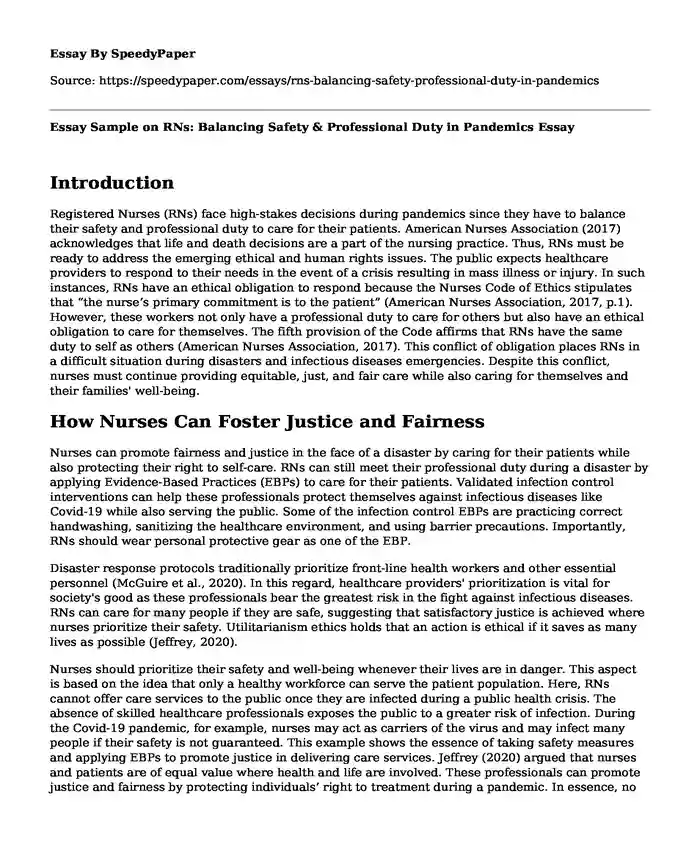
| Type of paper: | Essay |
| Categories: | Nursing Healthcare Covid 19 |
| Pages: | 3 |
| Wordcount: | 736 words |
Introduction
Registered Nurses (RNs) face high-stakes decisions during pandemics since they have to balance their safety and professional duty to care for their patients. American Nurses Association (2017) acknowledges that life and death decisions are a part of the nursing practice. Thus, RNs must be ready to address the emerging ethical and human rights issues. The public expects healthcare providers to respond to their needs in the event of a crisis resulting in mass illness or injury. In such instances, RNs have an ethical obligation to respond because the Nurses Code of Ethics stipulates that “the nurse’s primary commitment is to the patient” (American Nurses Association, 2017, p.1). However, these workers not only have a professional duty to care for others but also have an ethical obligation to care for themselves. The fifth provision of the Code affirms that RNs have the same duty to self as others (American Nurses Association, 2017). This conflict of obligation places RNs in a difficult situation during disasters and infectious diseases emergencies. Despite this conflict, nurses must continue providing equitable, just, and fair care while also caring for themselves and their families' well-being.
How Nurses Can Foster Justice and Fairness
Nurses can promote fairness and justice in the face of a disaster by caring for their patients while also protecting their right to self-care. RNs can still meet their professional duty during a disaster by applying Evidence-Based Practices (EBPs) to care for their patients. Validated infection control interventions can help these professionals protect themselves against infectious diseases like Covid-19 while also serving the public. Some of the infection control EBPs are practicing correct handwashing, sanitizing the healthcare environment, and using barrier precautions. Importantly, RNs should wear personal protective gear as one of the EBP.
Disaster response protocols traditionally prioritize front-line health workers and other essential personnel (McGuire et al., 2020). In this regard, healthcare providers' prioritization is vital for society's good as these professionals bear the greatest risk in the fight against infectious diseases. RNs can care for many people if they are safe, suggesting that satisfactory justice is achieved where nurses prioritize their safety. Utilitarianism ethics holds that an action is ethical if it saves as many lives as possible (Jeffrey, 2020).
Nurses should prioritize their safety and well-being whenever their lives are in danger. This aspect is based on the idea that only a healthy workforce can serve the patient population. Here, RNs cannot offer care services to the public once they are infected during a public health crisis. The absence of skilled healthcare professionals exposes the public to a greater risk of infection. During the Covid-19 pandemic, for example, nurses may act as carriers of the virus and may infect many people if their safety is not guaranteed. This example shows the essence of taking safety measures and applying EBPs to promote justice in delivering care services. Jeffrey (2020) argued that nurses and patients are of equal value where health and life are involved. These professionals can promote justice and fairness by protecting individuals’ right to treatment during a pandemic. In essence, no one should receive privileged care services at others' expense based on their social position or ability to pay (Jeffrey, 2020).
Conclusion
Nurses can enhance fairness and justice in the face of a public health crisis by offering care services to all people without discrimination. These professionals should apply EBPs to respond to people's needs while also protecting their well-being. Nurse safety is vital during a public health emergency since healthcare providers and the general public is of equal value. RNs as front-lines in healthcare can save as many lives as possible if their safety is safeguarded.
References
American Nurses Association. (2017). Ethics, the law, and a nurse’s duty to respond in a disaster. https://www.nursingworld.org/~4af058/globalassets/docs/ana/ethics/who-will-be-there_disaster-preparedness_2017.pdf
Jeffrey, D. I. (2020). Relational ethical approaches to the COVID-19 pandemic. Journal of Medical Ethics, 46(8), 495-498. https://doi.org/10.1136/medethics-2020-106264
McGuire, A. L., Aulisio, M. P., Davis, F. D., Erwin, C., Harter, T. D., Jagsi, R., Klitzman, R., Macauley, R., Racine, E., Wolf, S. M., Wynia, M., & Wolpe, P. R. (2020). Ethical challenges arising in the COVID-19 pandemic: An overview from the association of bioethics program directors (ABPD) task force. The American Journal of Bioethics, 20(7), 15-27. https://doi.org/10.1080/15265161.2020.1764138
Cite this page
Essay Sample on RNs: Balancing Safety & Professional Duty in Pandemics. (2023, Nov 30). Retrieved from https://speedypaper.net/essays/rns-balancing-safety-professional-duty-in-pandemics
Request Removal
If you are the original author of this essay and no longer wish to have it published on the SpeedyPaper website, please click below to request its removal:
- Family Case Report, Essay Example
- Law Essay for Free: Shilkret v. Annapolis Emergency Hospital Association
- Lavender Essential Oil for Burns. Paper Example
- Paper Example: The Process of Malarial Infection
- Essay Sample on How the Institutions Traumatize the Elderly Population
- Essay Sample on Use of ChartLogic in Charting
- Foodborne Diseases - Paper Example
Popular categories




